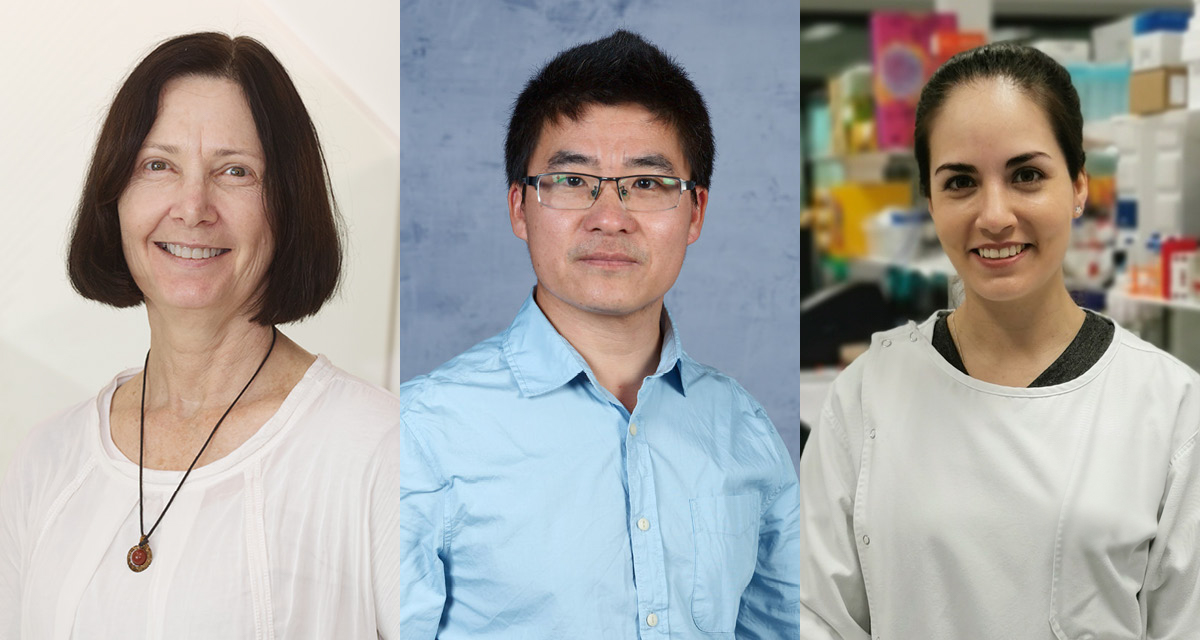
One of the researchers who helped crack the code of 10-year-old Northam girl Charlotte Patterson’s incredibly rare disease has received State Government funding that will allow her to use the same methods to rapidly assess the cases of hundreds more patients living with undiagnosed disease.
Head of the Translational Genetics Team at The Kids Research Institute Australia, Dr Vanessa Fear, is one of three researchers from The Kids to receive an Innovation Fellowship under the State Government’s Future Health Research and Innovation Fund (FHRI).
Cancer researchers Dr Tao Wang and Dr Mariana Lizeth Orozco Morales also received Innovation Fellowships, announced by Medical Research Minister Stephen Dawson. All three are also affiliated with The University of Western Australia.
Supported by the Fellowship, Dr Fear will use a protocol developed during the hunt for Charlotte’s diagnosis to assess hundreds of patient variants in a single assay – all in less than 12 weeks. Until now, such analysis has routinely taken five years.
Embedded in a cross disciplinary research program together with Clinical Professor Gareth Baynam and Associate Professor Timo Lassmann – who were also involved in solving Charlotte’s diagnosis – Dr Fear will use the SCRIPT (Single-cell CRISPR to Identify Pathogenesis with Transcriptomics) protocol to streamline the analysis of hundreds of genetic variants at the same time.
“SCRIPT is a revolutionary and innovative approach for functional analysis of genetic variants,” Dr Fear said. “It uses CRISPR gene editing and stem cell disease modelling to create ‘avatars’ of patient disease. Multiple avatars can be cultivated concurrently to form a ‘village in a dish’ scenario.”
The team can then further sort cells by genetic variant expression and determine the changes in cell function that cause patient disease. The protocol can also help point to treatment options and predict disease progression and trajectory.
“SCRIPT is poised to revolutionise genetics, delivering rapid, high throughput functional analysis of genetic variants, that will enable early interventional or preventative treatments to improve patient care,” Dr Fear said.
Dr Orozco – who works within the WA Kids Cancer Centre at The Kids and is biological leader at Setonix Pharmaceuticals, a biomedical start-up founded to build on research breakthroughs from The Kids and UWA – will use funding from the Fellowship to work on a new therapeutic approach to improve responses to immunotherapy in cancer treatment.
With her team, she will further investigate the mechanism of a protein that negatively affects the immune response to eliminate cancer cells.
“Ultimately, this innovation will lead to the development of an oral drug that can be used as a combination treatment to enhance responses to immunotherapy, as well as to improve patient survival and overall outcomes,” Dr Orozco said.
Dr Wang, who also works at the WA Kids Cancer Centre, will use his Fellowship to improve the efficiency of immunotherapy in treating cancer, using innovative RNA-based immune adjuvants that can mimic viral infection and help induce immunity.
His solution seeks to help those patients whose tumours have an immune-suppressive environment, making them resistant to immunotherapy.
“Converting immune-suppressive tumours to immune-sensitive is key to expanding the benefit of immunotherapy to more patients,” Dr Wang said.
“The goal is to develop a WA-centred RNA-based clinical trial, to bring hope to patients with immune-resistant cancers that are currently incurable.”
The Innovation Fellowship funding – $131,033 for Dr Fear, $115,339 for Dr Orozco, and $117,684 for Dr Wang – will be administered via UWA. The trio were among eight recipients of this round of Fellowships. For information on all recipients, see the Minister’s media release here.
